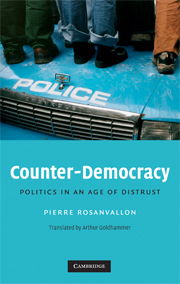Book contents
- Frontmatter
- Contents
- Foreword
- Introduction
- Part 1 Overseeing democracy
- 1 Vigilance, denunciation, evaluation
- 2 The overseers
- 3 The thread of history
- 4 Legitimacy conflicts
- Part 2 The sovereignty of prevention
- Part 3 The people as judge
- Part 4 Unpolitical democracy
- 14 Conclusion: the modern mixed regime
- Index
- References
3 - The thread of history
Published online by Cambridge University Press: 24 May 2010
- Frontmatter
- Contents
- Foreword
- Introduction
- Part 1 Overseeing democracy
- 1 Vigilance, denunciation, evaluation
- 2 The overseers
- 3 The thread of history
- 4 Legitimacy conflicts
- Part 2 The sovereignty of prevention
- Part 3 The people as judge
- Part 4 Unpolitical democracy
- 14 Conclusion: the modern mixed regime
- Index
- References
Summary
Three stages
Now that we have defined various forms and properties of counter-democracy, as distinct from institutionalized democracy, we are also in a position to take a fresh look at the history of liberty and collective sovereignty. We can divide this history into three periods. In the first period limited watchdog powers were established. These were in part liberal (limiting and regulating existing powers) and in part democratic (oversight exercised by representative bodies). These powers were themselves connected with the emergence of organized constitutional government. Self-regulation of the state (for the purpose of “rationalized” rule) was combined with “democratic” regulation of the state by society. Democratic institutions arose through competition over the power to supervise and regulate.
It would take a vast amount of research to write a comparative history of the public institutions of several countries along the lines sketched above. Obviously, nothing of the sort can be attempted here. It may be possible, however, to give some idea of what such a history would look like by concentrating on the most basic level of social power and focusing our attention on a small number of municipal and sub-municipal institutions. Conflicts over regulating the power of aldermen were common in medieval European towns. In Auvergne, for instance, aldermen and guilds were regularly at odds. The guilds insisted that town accounts ought to be subject to scrutiny by auditors chosen from outside the small group in power.
- Type
- Chapter
- Information
- Counter-DemocracyPolitics in an Age of Distrust, pp. 76 - 103Publisher: Cambridge University PressPrint publication year: 2008

